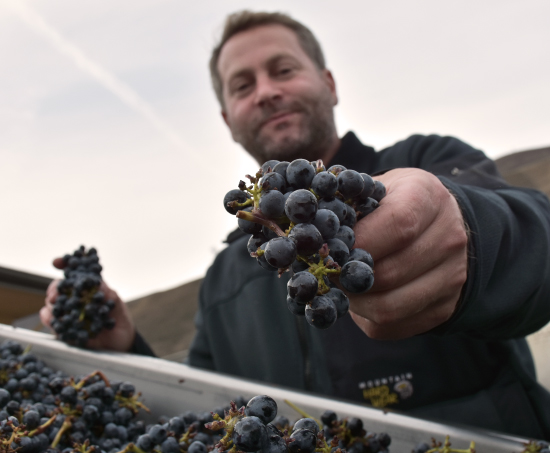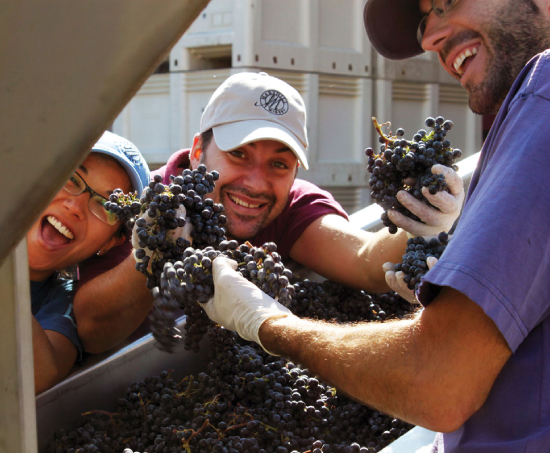High-quality, approachable wines.
Maryhill Winery produces 80,000 cases annually, partnering with 17 growers and 28 unique vineyard locations in 7 of Washington State’s 14 major American Viticultural Areas (AVAs), making it a true representation of the state’s wine. Throughout the year, winemaker Richard Batchelor works closely with local growers to collaborate on growing practices.
Maryhill is known for its use of a wide variety of grapes to create approachable wines, which showcase the impeccable technique and artistry of the growers who produce them. Batchelor’s passion, skill and discipline as a winemaker has been widely celebrated, but he humbly claims that a major factor in what comes out of the bottle is what is delivered from each vineyard.

Winemaker
Richard Batchelor is a highly acclaimed winemaker with an extensive knowledge of viticulture and a passion for making award-winning wines full of intense flavors and complexity. Joining Maryhill Winery in June of 2009, he is responsible for direction of all production activities at the winery, including winemaking, bottling, vineyard & grower relations and harvest coordination.
As a full production winery, Maryhill includes a state of the art bottling line and processing facility, a fully staffed laboratory, a barrel room which houses 2,000 oak barrels, a crossflow filter and glycol heating and cooling on all tanks. Maryhill employs a permanent cellar staff of 9 including our winemaker, production manager, bottling line manager, cellar supervisor, as well as a lab assistant and cellar staff.

Harvest
The majority of Northern Hemisphere harvesting occurs in September to early November with some late harvest wine grapes being harvested throughout the autumn.
Throughout harvest, Richard works closely with local growers and visits each vineyard to taste for maturity and ripeness to determine the precise moment to pick the fruit.
Grapes are harvested during the cool hours of the morning to preserve bright fruit notes.

Sort, Crush & Press
Maryhill's Proprietor's Reserve and Vineyard Series wines run through an optical sorter from a local Washington company. This photo eye technology ejects a jet of air to remove any non-berry the machine is programmed to eliminate, thus ensuring only perfectly colored berries make it into the tank.
For white wines, the juice is immediately drained from the skins and transferred to stainless steel tanks or barrels for fermentation. With the reds, the skins are kept on to create the beautiful red color and to extract all of the flavor and tannins. For the rosés, the skins are introduced for about 18 hours, depending upon desired color and flavor. The grapes are then pressed to obtain the pink juice to ferment.

Fermentation
Maryhill Winery utilizes both glycol cooling and heating on their tanks. The dimples on the tanks indicate a double walled area that is filled with glycol (a liquid-like food grade anti-freeze). Maryhill is one of the only wineries in Washington that use both cooling and heating control.
Maryhill allows the native yeast and flora of the grapes and winery to begin the red wine fermentation. This has created Maryhill's house style in red wines and also has developed a few different yeast strains to ferment the wines, culminating in a greater diversity of aroma and flavors. The whites are fermented with a cultured yeast. With long running partner vineyards aiming for consistent wine characteristics each year, Maryhill aims to produce whites with clear varietal distinctiveness. Consistency is key, especially when making large volumes of wine.

Clarification
Maryhill uses crossflow filtration technology for clarification. This method is automated and uses a gentle filtration, without other chemicals, to force wine through a medium. This allows for better retention of natural character and aroma in the finished wine, and helps to have less wine losses.
Crossflow filtration is a ‘soft’ process because the filtering is made without any change of state of the filtered element, and never gets distorted. It is also an environmentally-friendly process as no filter aid is used. It therefore has very strong advantages as it drastically simplifies the steps used to process the wine before bottling and it can reduce or eliminate the need for some consumables.

Aging and Bottling
Maryhill's barrel room has the capacity to hold up to 2,000 barrels at any given time. Several different types of oak from many countries are used for the barrels; French, Hungarian, Russian, Slovakian, and American oak.
In addition to aging the wine in barrels, the winemaking team also uses oak staves to deliver oaked characteristics to the wine. Oak staves are large planks or thick sticks of oak that are added to wine or juice in stainless steel tanks or barrels before, during or after fermentation.
Winemaking is both an art and a science. There are many decisions Richard and the team have to make, such as how long to keep a wine in oak, what kind of oak to use and what level of toasting.
The wine is then bottled on a state of the art bottling line. All wines are sterile filtered on the bottling line to ensure nothing can grow in the bottle before pulling a cork for enjoyment. Some wines in certain unique years will not be filtered to allow for a more traditional method approach to a finished wine.